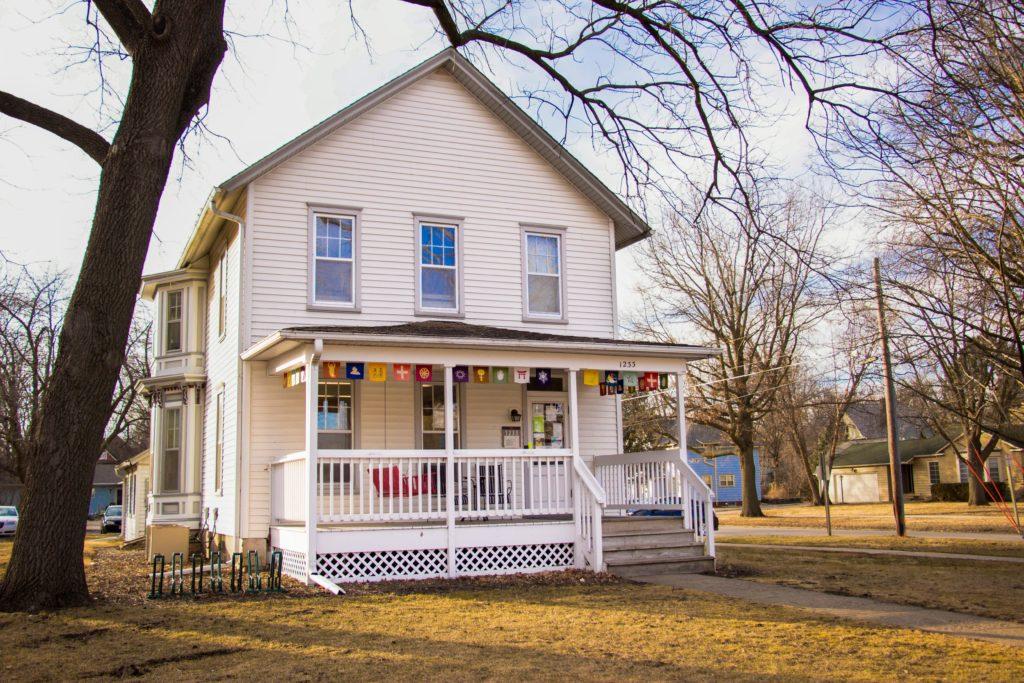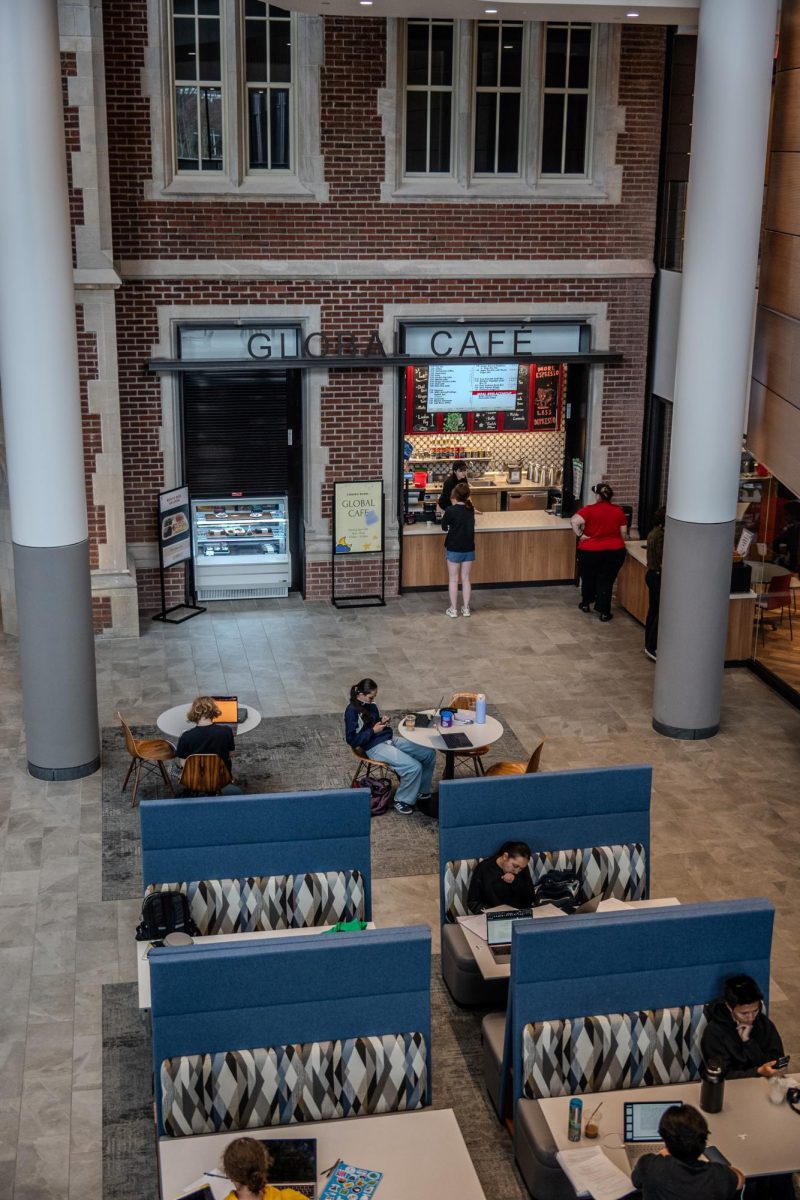
The Center for Religion, Spirituality and Social Justice (CRSSJ) will be downsizing and losing its Muslim prayer space at the end of the semester to make space for the construction of a new Admissions/Financial Aid Center at the southwest corner of 8th Ave. and Park St. Additionally, three language houses that also occupy the planned building’s site will be relocated over the course of the summer and fall.
Currently, the admissions office is housed in the John Crystal Center (JCC), but the College decided that there was a need for a new building that will be warmer and more welcoming for prospective students. The resulting relocation of the CRSSJ will result in a reduction of space for many users, most notably with the elimination of the current Muslim Cultural Suite, which is used both as a prayer room and for events. Farah Omer ’19, co-leader of the Muslim Students Association, is frustrated and upset about the loss.
“I don’t understand why there is not one single small space in this entire campus which they can give to Muslim students to pray. Do they even think that this is an important issue? Because if they did they would be able to find a room,” Omer said.
Benefits of the move include that, unlike the current space, the CRSSJ’s new home at 913 8th Ave. will be partially accessible and have a finished basement. Among the downsides are that Muslim students will be only able to pray in either in a small shared meditation area or in the shared prayer garage, which according to Omer fails to meet the needs of the Muslim community.
“A Muslim prayer space does not require a lot. It just requires a room that is clean, that has no shoes [allowed] and is not shared by anyone who … does not understand the conduct of being in the prayer room,” said Omer, adding that the prayer garage, “ will not provide a space … where [Muslim students] can come in any time of the day. What if there’s a meeting scheduled and then they cannot pray … some Muslims pray five times a day.”
In addition to the loss of the Muslim space, the new building will feature a significant reduction in size of the Hindu Cultural Suite as well as less general space for students to study and relax. For Omer the losses are part of broader pattern in how the College treats religious students, which has left her feeling that Grinnell is not committed to religious diversity. Omer wishes there had been broader consultation to ensure that the different affected communities’ needs were met, and she is left with questions about why it was decided that the loss of space was acceptable.
However, finding answers to those questions will be challenging, as there are competing narratives from Facilities Management (FM) and the CRSSJ staff surrounding the search for a new building. Director of FM Rick Whitney, who was tasked with working with the CRSSJ staff to find a new space, said that he was under the impression that the chosen site would in fact accommodate all of the center’s current users.
“Everything I understood to date is that we did match one for one … there was never any discussion about any existing space being excluded in the new space,” Whitney said, who added that he was not aware of the existence of the current Muslim space.
However, Chaplain Deanna Shorb, who heads the CRSSJ, said that she made Whitney aware that new building would not meet everyone’s needs, and she asked about the possibility about building an addition to prevent any losses.
“A dream would be in the future … to have an addition to have some of these cultural and prayer spaces for other world religions,” said Shorb, referring primarily to Hinduism, Islam and Buddhism.
According to Whitney, the decision about an addition is the responsibility of staff higher up in the administration. Despite her qualms about the new building, Shorb said she will try to make the best of what she has been given.
Unlike the case of the CRSSJ, the move of three language houses one block north will only result in temporary inconveniences. The planned site for the houses is currently occupied by a vegetable garden and the Reading Lab. And in advance of spring planting, the garden will be relocated to Elm St. north of 6th Ave. By the end of the semester, the Reading Lab’s current home will be demolished and it will move to 1204 East St. Finally, over the summer the language houses will be detached from their current foundations and rolled down the street on logs and placed in their new location. The news that the affected language communities will be housed in the residence halls until the houses are ready for occupancy during Fall Break is getting a mixed reaction from current residents.
Leah Reuber, Assistant Director of Residence Life, acknowledged that the temporary move to residence halls will not be able to recreate the experience that the language houses provide.
“The project houses are a physical space that really is conducive to the purpose of these language communities, in that can be completely immersive … in a way that is not physically allowed by a residence hall,” Reuber said. “But we are working hand in hand with faculty to make sure we can preserve that as much as possible.”
For Danica Bojovik ‘19, who lives in Russian House, one the biggest losses will be the lack of a dedicated kitchen for the preparation of food and hosting events.
“I think having those events would be possible, you can always just make some tea in the kitchen on the floor, but there would definitely not be that atmosphere,” she said. “The Russian language assistant just loves baking pies, having coffee and tea and other things to offer and that comes with [the Russian House] space and kitchen.”






















































Alumnus • Feb 20, 2017 at 6:29 pm
“In addition to the loss of the Muslim space, the new building will feature a significant reduction in size of the Hindu Cultural Suite as well as less general space for students to study and relax.”
THIS UPSETS ME
“However, finding answers to those questions will be challenging, as there are competing narratives from Facilities Management (FM) and the CRSSJ staff surrounding the search for a new building. Director of FM Rick Whitney, who was tasked with working with the CRSSJ staff to find a new space, said that he was under the impression that the chosen site would in fact accommodate all of the center’s current users.
‘Everything I understood to date is that we did match one for one … there was never any discussion about any existing space being excluded in the new space,’ Whitney said, who added that he was not aware of the existence of the current Muslim space.
However, Chaplain Deanna Shorb, who heads the CRSSJ, said that she made Whitney aware that new building would not meet everyone’s needs, and she asked about the possibility about building an addition to prevent any losses.”
THIS IS, AT BEST, INCOMPETENCE ON THE PART OF THE CRSSJ AND MORE IMPORTANTLY ON THE PART OF FM.